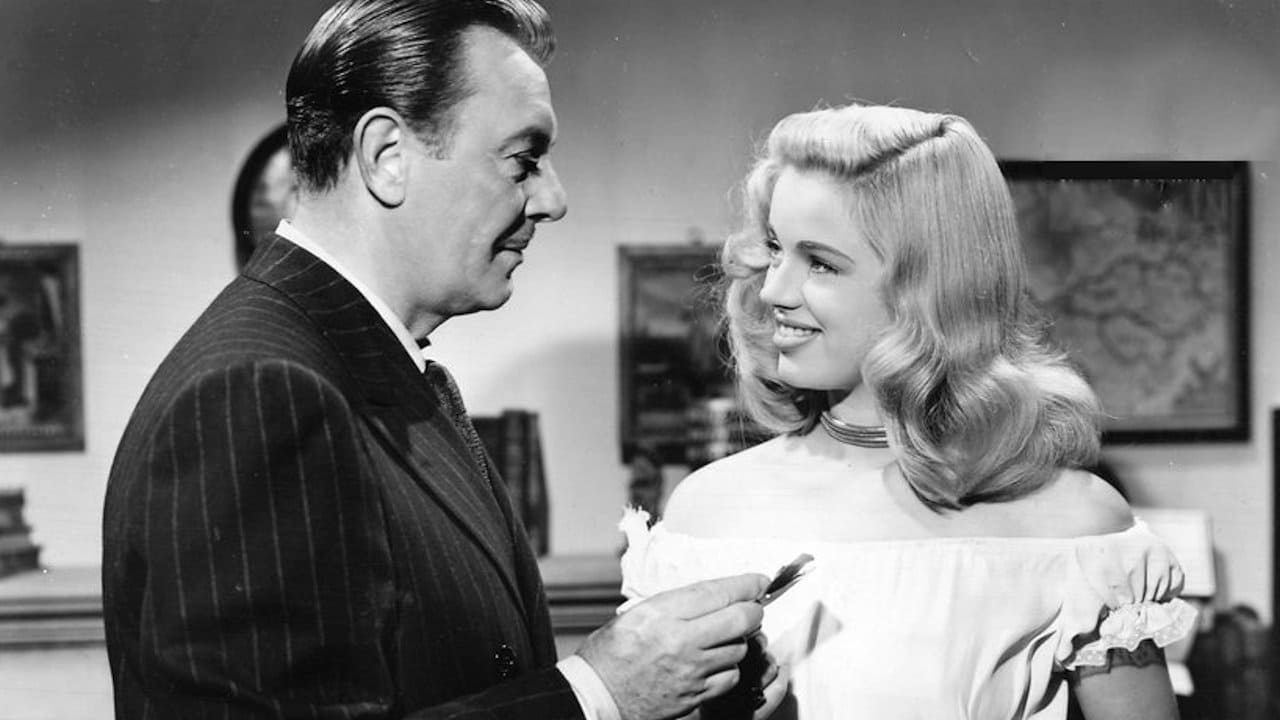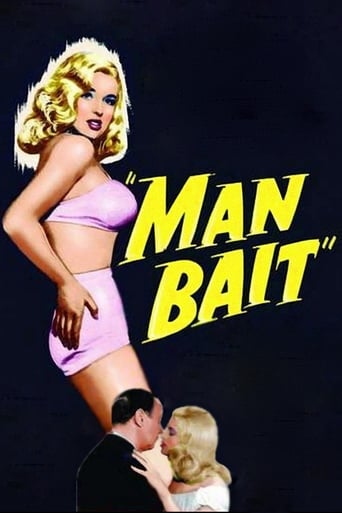

A better than average drama written by Frederick Knott, the author of "Dial M for Murder" and "Wait Until Dark", this shows Terence Fisher expertly handling a story of crime, lust and death during his efficient early phase working for Hammer Films, five years before the big success of "The Curse of Frankenstein". Although the main character is John Harman, the mature manager of a London bookstore (played by Irish actor George Brent), two young actors play more appealing characters who are key components of the plot and feature: Diana Dors and Peter Reynolds. A ravishing blonde beauty at 20, Dors had had a dozen of minor screen roles before being introduced in this production as Ruby Bruce, a sexy worker who turns everything around her upside down after she gets mixed up with Jeff Hart, a seductive ex-con played by Reynolds. Under Jeff's influence Ruby blackmails Harman, next a couple of corpses complicate the proceedings, soon Harman is accused of murder and then his secretary (American actress Marguerite Chapman) helps to solve the mystery, putting her life in danger. Peter Reynolds is fine, but he does not have much to do as the villain with sinister charm. It is Diana Dors who has more room for creating a real character. She was a very good actress, and although comparisons were often made with Marilyn Monroe, on the acting level she surpassed her American colleague: here she convincingly mixes naive wickedness with vulnerability, making the film not only the account of Harman's story but the drama of a confused working girl as well.
... View MoreA lot of people seem to have noticed that there's not much logic gone in to this film . Before we start dishing out awards and starting up a Nobel prize for self congratulations let's be entirely honest in saying it's impossible not to notice the constant and flawed thinking that seems to have gone in to almost every scene . My own personal complaint with MAN BAIT from the outset is that two of the main characters are American living in London in the early 1950s . Let's think about this . American won the war, became a superpower overnight and was winning the peace in spectacular fashion while Britain also won the war and lost the peace along with the empire so badly that the standard of living at this time wasn't much better than in the defeated axis powers . Shocking to think that when this film was produced petrol rationing had just ended and certain foodstuffs were subject to rationing in Britain and yet a couple of Americans are quite happy to live in a starving , rain soaked archipelago where fridges and car ownership would be fairly unknown but power cuts would be common . You can understand the producers wanting to bring in a couple of American actors because it makes American distribution of the film more attractive . You can't help asking would it not have been better if the production team had concentrated on telling a more credible story This is a pity because you can easily see the potential that MAN BAIT had in wanting to be something of a British noir classic . In fact just reading the plot summary on this page finding himself attracted to a pretty blonde clerk that leads to a plot of blackmail and murder so the bare bones of a good involving thriller are there . However it's the way the story unfolds that is a serious problem and undermines most of the potential . People don't do anything in a logical manner and they don't react to situations that you would recognise as being realistic which means the only thing you'll remember from this film is that it starred Diana Dors when she was a starlet of British cinema and that many of the people behind the scenes went on to make Hammer studios a successful horror film franchise
... View MoreThe Last Page (AKA: Man Bait) is directed by Terence Fisher and adapted to screenplay by Frederick Knott from James Hadley Chase's story. It stars George Brent, Marguerite Chapman, Raymond Huntley, Peter Reynolds and Diana Dors. Music is by Frank Spencer and cinematography by Walter J. Harvey.John Harman (Brent) is a London bookshop manager who finds himself blackmailed by his busty young assistant, Ruby Bruce (Dors), and her new ex-convict beau Jeffrey Hart (Reynolds), when he foolishly steals in for a kiss during after hours stock taking.Bookshop Noir.British Hammer and American Exclusive teamed up to produce a number of low budget crime dramas in the early 1950s, often using American stars and directors blended in with British actors, they were produced in Britain in next to no time. The Last Page is a safe viewing for the undemanding film noir fan. Terence Fisher would become a legend amongst British horror fans (rightly so) for his work on Hammer's reinvention of the Universal Creature Features. Here he crafts a nifty atmospheric melodrama without fuss or filler, while just about managing to stop the flaws and daftness of plotting from sinking the picture.Story has some interesting noirish characters and themes. The man who begins to pay for a moment of weakness, the young shapely gal in over her head-lured to the dark half by a well spoken criminal element, while some secret passions amongst the staff of this particular bookstore come to the fore once things inevitably go pear shaped. The setting is a doozy as well, this bookstore is perfectly antiquated, so much so you can smell the leather bound novels nestling on the shelves. Walter Harvey's (The Quatermass Experiment) photography ensures that shadows feature throughout, and there's the odd macabre touch that befits the writing of Frederick Knott (Dial M for Murder/Wait Until Dark).Cast are professional to the last. Brent (The Spiral Staircase) and Huntley (I See a Dark Stranger/Night Train to Munich) are the epitome of gentlemen in a rut, stoic and stiff, grumpy yet gritty, but nicely portraying men we expect to appear in a bookstore noir. Chapman (Coroner Creek) has an abundance of hard looking sexuality and Reynolds has a spiv nastiness about him, very cold but charming. But it's Dors who holds all the aces, she would impress herself upon many a red blooded male during three decades of British film and TV. Here at aged 21, as Ruby, she's a curvy blonde babe with full lips, a gal who understandably turns the heads. The character is tardy as well, hardly a crime, but mostly in Dors' hands she's believable as a girl clearly out of her depth, she's not a femme fatale, she's a weak willed person hurtling towards film noir doom. It's here where this British B noir gets its worth.It's not a great film by any stretch of the imagination, but it is a good one considering the modest budget afforded it. There's dumb decisions made by characters, holes of plotting and the ending fails to seal the deal after the hard noirish mood eked out by Fisher, Harvey and Dors. However, as film noir time fillers go, it's well worth checking out. 6.5/10
... View More...First thing he does is go to a bookstore. He tries to steal a book. That is how logical this movie is throughout. When we see shelves of books at a time, later, the books seem to be attached to each other. They're like room decorations some people buy in bulk.The proprietor of this bookstore is, of all people, George Brent. He had a long career. Though this is a noir of sorts and I therefore can't give it a bad rating, let's just say this is hardly a career highlight for him.Marguerite Chapman is attractive and convincing as his employee. She's stylish and pretty and comes off as nice.This is an early Diana Dors film. She's decent in it. She gets pulled into some very bad behavior. But she's not a truly terrible character. She's chronically late to work and weak willed.This isn't a memorable or distinguished film. But it isn't terrible, either. Nor does it hold to any formula. It's mediocre in a unique way.
... View More